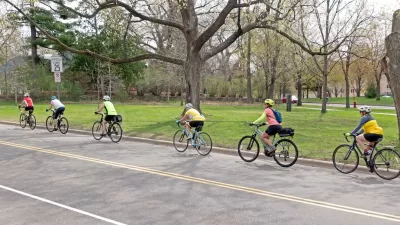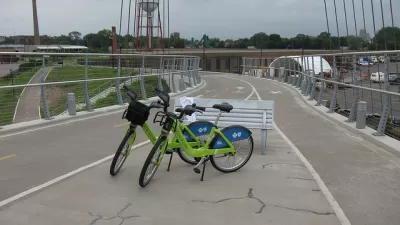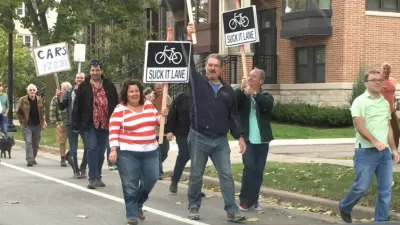Swatting down untruths and misinformation by bike lane opponents in St. Paul doesn't require a PhD, but it helps.

Writing in BeyondChron, Bill Lindeke sets the record straight on a few points used by bike lane opponents as St. Paul expands its bicycle path network through the city. Lindeke, a St. Paul Planning Commissioner who has a PhD in geography and bicycle planning, writes about his frustration at flyers given to neighbors along Cleveland Avenue, where opponents have stepped up efforts to block a bike lane on the street that would result in the loss of or shift of some street parking to side streets.
If you believe that your career depends on a parking space, there’s no amount of research, argument, or kindness that will convince you that a bike lane might benefit Cleveland Avenue.
And to make a long story short, this flier represents a dishonest argument about street design that appeals to those invested in the status quo. On the surface, these objections might seem reasonable. But they actually reflect how inflexibility about street design and urban transportation, in order to cling to slight comforts, keeps a dangerous precedent in place for another decade.
Opponents have cited the proposed reduction of driving lane widths on Cleveland from 12 feet to 11 feet as creating a dangerous situation, although as Lindeke points out, just the opposite is true. Statistics show that in the urban environment wider lanes are more dangerous than narrower lanes.
Opponents are also asking that the route be entirely "off-street" for safety reasons, or else the entire thing should be scrapped. Lindeke notes that "smart cities build infrastructure for the whole range of bicyclists and allow them to choose where and how quickly they want to ride… it turns into a spectrum of bicycle infrastructure." Asking for perfection or nothing is just another tool of opponents to block bicycle lane development, Lindeke argues.
FULL STORY: Two Anti-Bike Lane Narratives that Need to Stop

Alabama: Trump Terminates Settlements for Black Communities Harmed By Raw Sewage
Trump deemed the landmark civil rights agreement “illegal DEI and environmental justice policy.”

Planetizen Federal Action Tracker
A weekly monitor of how Trump’s orders and actions are impacting planners and planning in America.

The 120 Year Old Tiny Home Villages That Sheltered San Francisco’s Earthquake Refugees
More than a century ago, San Francisco mobilized to house thousands of residents displaced by the 1906 earthquake. Could their strategy offer a model for the present?

Ken Jennings Launches Transit Web Series
The Jeopardy champ wants you to ride public transit.

BLM To Rescind Public Lands Rule
The change will downgrade conservation, once again putting federal land at risk for mining and other extractive uses.

Indy Neighborhood Group Builds Temporary Multi-Use Path
Community members, aided in part by funding from the city, repurposed a vehicle lane to create a protected bike and pedestrian path for the summer season.
Urban Design for Planners 1: Software Tools
This six-course series explores essential urban design concepts using open source software and equips planners with the tools they need to participate fully in the urban design process.
Planning for Universal Design
Learn the tools for implementing Universal Design in planning regulations.
Clanton & Associates, Inc.
Jessamine County Fiscal Court
Institute for Housing and Urban Development Studies (IHS)
City of Grandview
Harvard GSD Executive Education
Toledo-Lucas County Plan Commissions
Salt Lake City
NYU Wagner Graduate School of Public Service





























